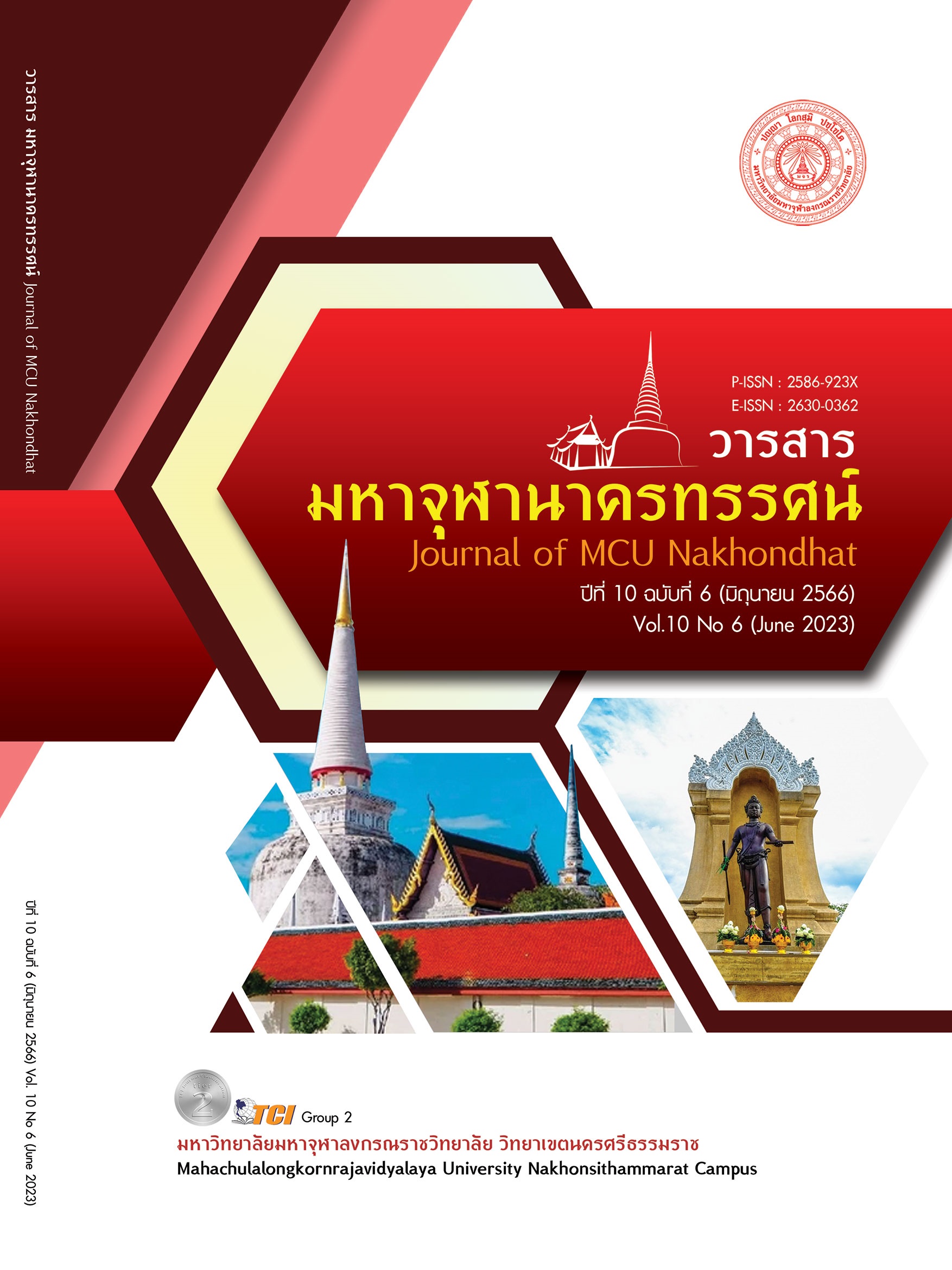BUDDHIST LEADERSHIP COMPONENTS OF LOCAL ADMINISTRATORS NONTHABURI PROVINCE
Main Article Content
Abstract
Research Buddhist leadership components of local administrators Nonthaburi Province Objectives: 1) to study the components of Buddhist leadership of local administrators; Nonthaburi Province and 2) to analyze the components of Buddhist leadership of local administrators. Nonthaburi Province conducting research by studying Tripitaka Documents and research on Buddhist leadership based on the Tuthiyapaphanikha Sutta. Then interview the experts. to find component definitions and indicators and collecting information from executives and personnel local government organization Nonthaburi Province by using a stratified random sampling method. A group of 500 samples was obtained for statistical analysis. by elemental analysis. The results showed that Buddhist leadership components of local administrators Nonthaburi Province In total, it consists of 3 components and 23 indicators, namely 1) Chakkuma, a person with broad vision (Conceptual Skill), which consists of 6 indicators with weights ranging from 0.312 -0.622, with the indicators having the highest weights. including local administrators and staff use SWOT techniques for organizational analysis and development. 2) Withuro is a person with expertise in the job. know the principles and methods There are good management (Technical Skill), consisting of 7 indicators, with a component weight ranging from 0.303 - 0.742. that does not increase the workload, and 3) Nissayasampanno, which is a person with good human relations (Human Relation Skill), consisting of 10 indicators, with a component weight ranging from 0.347 - 0.675, with the indicator having the highest component weight, namely, local administrators giving Honor and show sincerity to personnel at all levels of the organization.
Article Details

This work is licensed under a Creative Commons Attribution-NonCommercial-NoDerivatives 4.0 International License.
References
ขวัญนภา วงศ์ไพศาลสิริกุล และอารง สุทธาศาสตร์. (2562). “รูปแบบภาวะผู้นำของผู้บริหารองค์กรปกครองส่วนท้องถิ่นที่ส่งผลต่อการมีส่วนร่วมของประชาชนในการพัฒนาท้องถิ่น”. วารสารบัณฑิตวิทยาลัย พิชญทรรศน์, 14(3), 1-11.
ดวงตา ราชอาษา. (2559). “บทบาทของผู้นำในกระบวนทัศน์ใหม่”. วารสารวิชาการแพรวากาฬสินธุ์, 3(2), 180–196.
พระธรรมโกศาจารย์ (ประยูร ธมฺมจิตฺโต). (2549). พุทธวิธีการบริหาร. กรุงเทพมหานคร: โรงพิมพ์มหาจุฬาลงกรณราชวิทยาลัย.
พระพลากร สุมงฺคโล (อนุพันธ์). (2557). ความคิดเห็นของบุคลากรที่มีต่อการบริหาร งานตามหลักอธิษฐานธรรม ขององค์กรปกครองส่วนท้องถิ่นในเขตอำเภอจังหาร จังหวัดร้อยเอ็ด. ใน วิทยานิพนธ์พุทธศาสตรมหาบัณฑิต สาขาวิชารัฐประศาสนศาสตร์. มหาวิทยาลัยมหาจุฬาลงกรณราชวิทยาลัย.
พระมหาวุฒิชัย วชิรเมธี (ว.วชิรเมธี). (2554). ภาวะผู้นำ: จากเนลสัน มันเดลา โอบามา แห่งทำเนียบขาว. กรุงเทพมหานคร: สำนักพิมพ์สถาบันวิมุตตยาลัย.
มหาจุฬาลงกรณราชวิทยาลัย. (2539). พระไตรปิฎกฉบับภาษาไทย ฉบับมหาจุฬาลงกรณราช วิทยาลัย. กรุงเทพมหานคร: โรงพิมพ์มหาจุฬาลงกรณราชวิทยาลัย.
รณิดา มนต์ขลัง และคณะ. (2559). “ปัจจัยที่มีอิทธิพลต่อความสำเร็จของการนำนโยบายการจัดบริการสุขภาพผู้สูงอายุไปสู่การปฏิบัติ ขององค์กรปกครองส่วนท้องถิ่น”. วารสารวิชาการแพรวากาฬสินธุ์, 3(2), 133–153.
สมบัติ บุญเลี้ยง และคณะ. (2555). “ลักษณะภาวะของผู้นำที่ดีในการบริหารองค์กรปกครองส่วนท้องถิ่น”. มนุษยศาสตร์สังคมศาสตร์, 29(2), 97–112.
อภิรมย์ สีดาดำ และคณะ. (2564). “ภาวะผู้นําเชิงพุทธในยุค New Normal”. วารสารธรรมวิชญ์, 3(1), 410 – 423.
Boonleaing, S.,etal. (2011). “The Leadership characteristics and efficiency of local administrative organizations: A case study of local administrative organizations in the lower north region of Thailand”. International Business & Economics Research Journal, 9(12), 119-122.
Eric Schmidt and Jared Cohen. (2014). he New Digital Age : Reshaping the Future of People, Nations and Business. T. London: John Murray.
Mai Chi Vu. (2018). Spiritual Leadership. A Buddhist Approach: Durham theses Durham University.
Toffler Alvin. (1980). The Third Wave. New York: William Marrow & Co.


